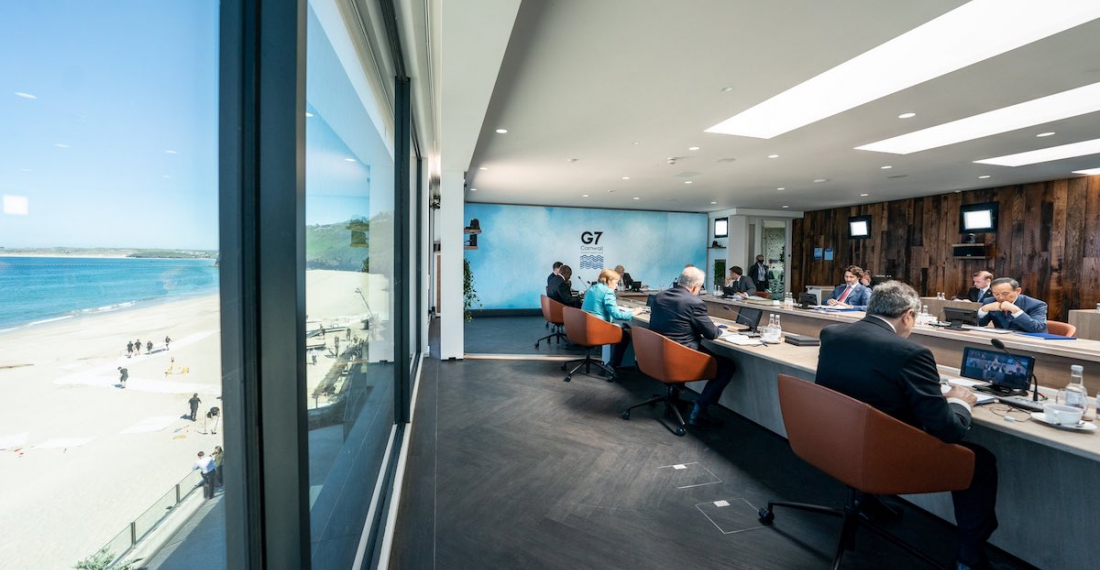"We look forward to working alongside our G20 partners and with all relevant International Organisations to secure a cleaner, greener, freer, fairer and safer future for our people and planet". This was stated by the leaders of the G7 countries when they ended their meeting in Cornwall in England on Sunday (13 June).
The leaders agreed a shared G7 agenda for global action to:
● End the pandemic and prepare for the future by driving an intensified international effort, starting immediately, to vaccinate the world by getting as many safe vaccines to as many people as possible as fast as possible. Total G7 commitments since the start of the pandemic provide for a total of over two billion vaccine doses, with the commitments since we last met in February 2021, including here in Carbis Bay, providing for one billion doses over the next year. At the same time we will create the appropriate frameworks to strengthen our collective defences against threats to global health by: increasing and coordinating on global manufacturing capacity on all continents; improving early warning systems; and support science in a mission to shorten the cycle for the development of safe and effective vaccines, treatments and tests from 300 to 100 days.
● Reinvigorate our economies by advancing recovery plans that build on the $12 trillion of support we have put in place during the pandemic. We will continue to support our economies for as long as is necessary, shifting the focus of our support from crisis response to promoting growth into the future, with plans that create jobs, invest in infrastructure, drive innovation, support people, and level up so that no place or person, irrespective of age, ethnicity or gender is left behind. This has not been the case with past global crises, and we are determined that this time it will be different.
● Secure our future prosperity by championing freer, fairer trade within a reformed trading system, a more resilient global economy, and a fairer global tax system that reverses the race to the bottom. We will collaborate to ensure future frontiers of the global economy and society, from cyber space to outer space, increase the prosperity and wellbeing of all people while upholding our values as open societies. We are convinced of the potential of technological transformation for the common good in accordance with our shared values.
● Protect our planet by supporting a green revolution that creates jobs, cuts emissions and seeks to limit the rise in global temperatures to 1.5 degrees. We commit to net zero no later than 2050, halving our collective emissions over the two decades to 2030, increasing and improving climate finance to 2025; and to conserve or protect at least 30 percent of our 1 land and oceans by 2030. We acknowledge our duty to safeguard the planet for future generations.
● Strengthen our partnerships with others around the world. We will develop a new partnership to build back better for the world, through a step change in our approach to investment for infrastructure, including through an initiative for clean and green growth. We are resolved to deepen our current partnership to a new deal with Africa, including by magnifying support from the International Monetary Fund for countries most in need to support our aim to reach a total global ambition of $100 billion.
● Embrace our values as an enduring foundation for success in an ever changing world. We will harness the power of democracy, freedom, equality, the rule of law and respect for human rights to answer the biggest questions and overcome the greatest challenges. We will do this in a way that values the individual and promotes equality, especially gender equality, including by supporting a target to get 40 million more girls into education and with at least $2¾ billion for the Global Partnership for Education.
The statement concluded:
"We shall seek to advance this open agenda in collaboration with other countries and within the multilateral rules-based system. In particular, we look forward to working alongside our G20 partners and with all relevant International Organisations to secure a cleaner, greener, freer, fairer and safer future for our people and planet."







